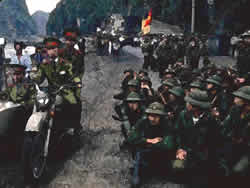Home » History of Vietnam » Early History » A Gentle Land
A Gentle Land
 Like most tropical countries, VietNam gets up with the light, and one of the greatest pleasures you can find is to go outside at six in the morning and see the whole town out stretching its limbs, playing badminton or soccer in the streets, ghosting its way through tai chi motions.
Like most tropical countries, VietNam gets up with the light, and one of the greatest pleasures you can find is to go outside at six in the morning and see the whole town out stretching its limbs, playing badminton or soccer in the streets, ghosting its way through tai chi motions.
And for all the bullet holes that scar the country, the foreigner has only to say he’s from America, and he is greeted with shiningly genuine smiles. “For us, French is the language of power and love,” a Vietnamese friend explained. “English is the language of commerce. Russian is the language of quarrels,” The only preparation an American need make if going to VietNam today is to free his mind of preconceptions and images: the only things he need fear are an excess of curiosity and goodwill.
It is hard, in fact, not to grow woozily romantic when enumerating the holiday seductions of the land. There are mist-wreathed rain forest in the west and north, where you can find 53 distinct minority tribes each with its own colorful costume, customs, and tongue-hunting still, with bows and arrows. There are atmospheric old French villas, peeling behind coconut palms and green gates, made more nostalgic now by decay, and lined by lovely avenues of tamarind. There are illuminated lanterns and oil-lit lamps along the crooked streets at night, which take you back to the indochina of your dreams, and the urbane pleasures of white-linen restaurants serving mandrin juice and coq au vin while serenading you with piano and violin duets. There are 1, 400 miles of coastline studded with deserted pure-white beaches, and there are prices that are extravagantly low.

Most of all, though, there are the exceptionally attractive, cultured, and hospitable people, who still light up at the sight of foreigners, yet who are still selfpossed and full of quick intelligence-for which they have long been famous.
Yet the real attraction of VietNam today comes from something deeper. When we choose a place to visit, the way a country carries itself and markets itself the way it knows itself, really- is everything. We flee certain resorts not just because they are touristed but more because they have begun to see themselves through tourist’ eyes, to amend themselves to tourists’ needs, to carry themselves in capital letters; because, in short, they have simplified themselves into their sense of what a foreigner wants.
None of this is true-yet-of VietNam, which still has the bashful charm of a naturally alluring girl stepping out into bright sunlight after years of dark seclusion. Protected, ironically, by its years of hardship and cut off from modernity by almost two decades of communist rule, VietNam is still, more than most places, new to the world. It does not know what to make of us, nor we of it. Its pleasures feel unrehearsed, and surprise is still a growth industry there.
VietNam is a kind of place where restaurants offer armadillo and cobras slaughtered at your table; artichoke tea, gecko -steeped liqueurs and-the specialty of Dalat-coffee made from beans vomited up by a weasel. It is a place where beer cost more than wine, and a coke more than an entire meal.

It is also a place where traveling by car means bumping along Highway 1, through a confusion of bicycles, shrouded in brushes and brooms, buses piled high with tail-wagging dogs, and horse-drawn carts, at speeds no faster than 10 m.p.h., over “elephant holes” that put out the backs of any foreigners who are not banging their heads against the roofs, and where, after nightfall, the only lights one sees are reflections in the eyes of passing water buffalo. The alternative taking the local airlines may not be any happier. On one flight, all the seats in the back two rows were different colors, the portholes were guarded by flimsy curtains, and the back third of the aircraft a former Soviet military plane was an empty space with trays of meatballs stacked on the floor (and later handed out by a phlegmatic teenage boy). The whole place had the air of a hospital waiting room in the clouds.
Insofar as any Marxism is to be found in VietNam, Hanoi, of course, is the place; yet even in the capital it is hardly strident. Groups of peasants from the countryside troop all day long around the Ho Chi Minh Museum, but the main item of interest for them may well be the corner that features a Coke sign, a plaster-cast packard, and Don McCullin’s photo of a shell-shocked grunt.
And in any case, the nominal principles of the Party are contradicted all day long by a cacophony of deals. Everywhere seems a marketplace in Hanoi, and every street is bubbling over with free trade: one block given over to a stack of black-and-white TV’s another to a rack of bicycles. In another block, 30 barbers are lined up with their backs to the traffic, their mirrors set along the wall before them. Old men puff Hero and Gallantes cigarettes over pyramids of Nescafe’ bottles, bookshops explode with stacks of Madonna fan mags. In the covered market, US$15-a-kilo turtles and fat snakes sit next to “Maraadona Jeans” caps and shirts with “One Hundred Dollars” printed on them. And out on the streets, the stalls are loaded with knockoff Casios, Disney T-shirts, snoopy bags, and pills guaranteed to save one from “addiction to narcotics.” An absence of external resources is more than made up for by inner: A teacher in VietNam earns US$9 a month, yet half the households in the country, according to my guide, have VCRs.
All this is why VietNam is changing before one’s very eyes-and anyone who saw Bangkok or Beijing eight years ago and revisited either place today knows that Eastern cities can take off with the urgency of a Chinese firecracker. Ever since the government in Hanoi decided to open up the country to free trade and private enterprise several years ago, the famous energy and enterprise of the Vietnamese have been transforming the country at the speed of light. And now, as relations are finally normalized with Washington, the boom-town electricity of the country feels more palpable than ever: as if much of VietNam were letting out its breath, in a great gust of relief, after years-and years-of holding it in.

